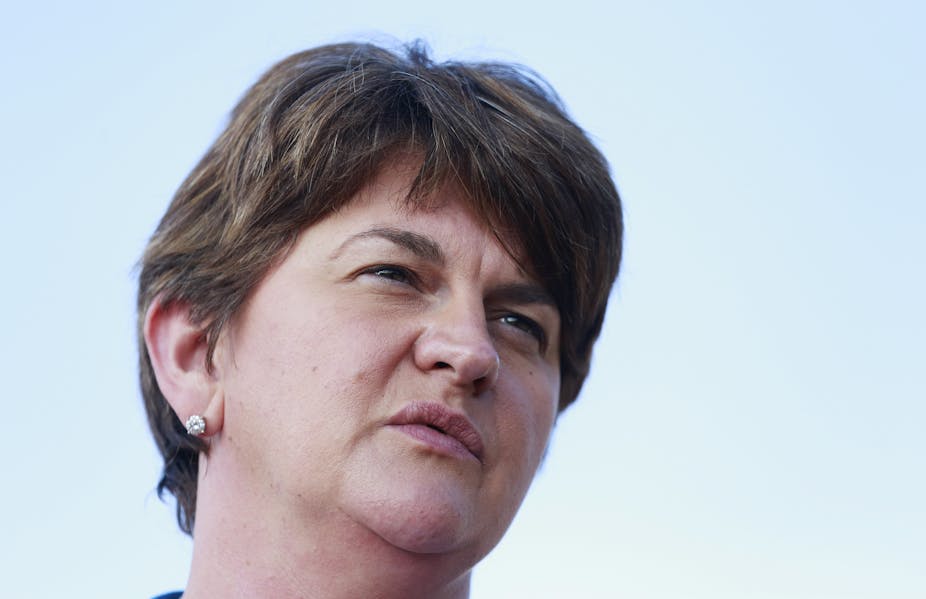Northern Ireland is to have a new first minister in January, in the form of Arlene Foster, the new leader of the pro-UK Democratic Unionist Party. Foster will take over from her DUP colleague Peter Robinson, who has held the position since 2008.
Her arrival as leader will mark a pivotal change for the party and for Northern Ireland. This is what you need to know about the woman taking on the most tumultuous job in British politics.
She’s a she!
Foster is the first woman to lead Northern Ireland – which is certainly worth shouting about given the current gender disparity in the national assembly and at all levels of government.
Over the past 15 years, in local, national and European elections, Northern Ireland has been shamed by the gender parity efforts of the UK’s other devolved institutions.
The Scottish parliament and Welsh Assembly have had an average of 37% and 45% of female elected representatives respectively since 1998. Northern Ireland lags considerably behind at just 17%.
One of the main hurdles to gender equality are the conservative gender roles that Foster herself has acknowledged when we interviewed her in 2013:
Inevitably I get asked the question of my children … and what is really frustrating is that you never ask that of any of my male colleagues … I think Northern Ireland is a very conservative society. I think it’s changing and I do think that generally the electorate want to see a reflection back at them of society.
The analysis is spot on. In the 2015 General Election Survey, almost two-thirds (65%) of people in Northern Ireland said they wanted to see more women elected.
During an all woman focus group, party members referred to Foster as an inspiration and “the champion of women” in the DUP. Let’s see if she will live up to expectation.
She voted against the Belfast Agreement
The peace process in Northern Ireland culminated in the Belfast/Good Friday Agreement in 1998. The deal was approved by 72% of the population in Northern Ireland – but Foster wasn’t one of them.
She opposed the vague arrangements being made for IRA decommissioning, the early release of paramilitary prisoners and reforms to policing.

Having negotiated further on some of these key issues in subsequent agreements, including Sinn Fein’s support for policing in the region, the DUP entered power sharing with its historic republican enemy in 2007.
Interaction between the two governing parties remain minimal and relations are tense, but Foster has said that the difficulties between the two parties must be overcome since both have a mandate to govern. Pragmatism, it seems, trumps the politics of dislike.
She used to be in the Ulster Unionist Party
In 2004 Foster was among a group of politicians who defected from the Ulster Unionist Party to the DUP. She brought many grass roots supporters with her. One local party member exclaimed at the time: “Wherever Arlene goes, I follow”.
Between 1998 and 2006 the Belfast Agreement acted as the catalyst for a mass defection from the UUP to the DUP. The DUP was presenting itself as a party of protest and pledged to make sure Northern Ireland remained part of the UK. The UUP was seen as conceding too much to Sinn Fein at the expense of the unionist community.
The DUP’s defence of the union remains its main appeal – something Foster, as a former UUP member, will be well aware of.
She voted against same-sex marriage
The DUP is largely conservative and greatly influenced by Evangelical Christian beliefs. The UUP defectors tend to be less religious but the bulk of the party continues to oppose same-sex marriage and abortion.
Two-thirds of DUP party members say they think homosexuality is wrong and the party (including Foster) blocked a vote to legalise same-sex marriage in November, even though it had been approved by the assembly. This position appears out of step with public opinion in Northern Ireland, since only 28% in the Northern Ireland Election Survey opposed same-sex marriage.

When it comes to abortion, four-fifths of the party membership are against legalisation in Northern Ireland. This, again, leaves the DUP in a difficult position, since a high court judge recently ruled the current law on abortion in Northern Ireland is “incompatible” with human rights law and that the almost total ban on access in Northern Ireland should at least be relaxed in cases of rape, incest and fatal foetal abnormalities. Less than a third of the Northern Irish population disagree that abortion should be legalised.
While the DUP remains relatively united against any change on either of these issues, Foster faces the tricky task of justifying its stance to the broader population.
She’s not entirely new to the job
Foster has in fact held the position of first minister before, replacing Robinson for six weeks as acting first minister in 2010 while he dealt with allegations about his finances.
During this time, she steered the DUP ship through significant political wrangling. Her appointment signalled that the DUP had faith in her political leadership. The looming election is an opportunity for Foster to assert her authority and set the tone for her tenure as party leader.
Her first tasks will be to work out how to accommodate a burgeoning DUP membership base with a broadening spectrum of attitudes, how to take on her former colleagues (and now main political rivals) at the UUP, and how to shore up the electoral gains made under her predecessor.

